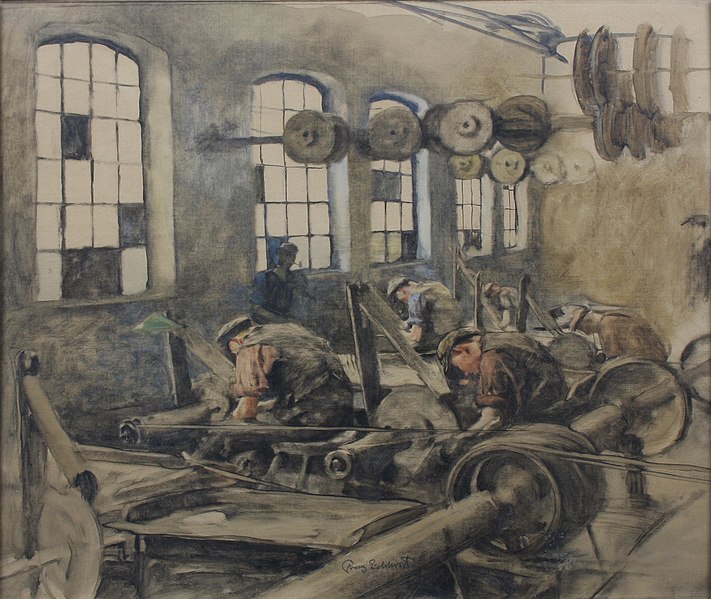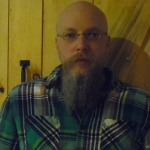Aaron Weinacht (AW): I always like to get a sense of how authors come to the topic they’ve written about, so we’ll start off there. How did you and your co-author Robin Phillips come to write Are We All Cyborgs Now?
Josh Pauling (JP): As with most books, they have a long backstory. In my case, I’d say it’s really a twenty-year project in some ways. Ever since college, the intersection of technology and humanity–what Marshall McLuhan in the 1960s so insightfully called media ecology–has just fascinated me. After college I worked for a seminary that was beginning a “Virtual Campus.” They had done correspondence courses for years but were now on the front lines of moving into the online space. I worked in their student services department and their main IT guy and I struck up a wonderful friendship and partnership in reading and discussing the unintended consequences of technology. I remember we’d go back and forth from each other’s offices sharing what we’d been reading from Neil Postman or Lewis Mumford or Jacques Ellul or Martin Heidegger. Funny to think that we were working in online education!
Then my interest and research in the philosophy of technology further took off in grad school, when I was pursuing my Masters in Teaching. In so many of the practical and pedagogical education courses, we were encouraged to incorporate new technology into our teaching. But I grew more and more skeptical of the narrative of technological progress and the inbuilt assumption that newer equaled better, or that just because we can do something technologically, we should.
I really dug further into the works of authors like Postman, Heidegger, Ellul and others on the philosophical side of the question, but also dug into the research side of things and began seeing that actual data regarding improved educational outcomes wasn’t really there in support of implementing all these new technologies in the classroom.
All this played out in my years teaching in a large, diverse, public high school where new technologies were incorporated with little forethought. Smartboards were all the rage when I began teaching. Then came classroom carts with iPads, then came the impact of the smartphone, then came one-to-one initiatives where each student was issued a Chromebook, then came Google Classroom and digitally mediated education. Then came big million-dollar contracts with companies like Discovery Education which encouraged even more screen time in class. Then came COVID, which increased screen and device-centric education. It was like in-person education was turning into online education, but while all sitting in the same room. I was a vocal skeptic of all these changes and had some small victories along the way in my school. I began collecting student smartphones in my own classroom long before it became the trendy thing, and then the principal asked me to share it with the whole school the following year for implementation school-wide. That was a victory!
Throughout all these years I was also running a little woodworking and custom furniture business, and also have been involved in athletics as a player and coach, which were great counterbalances to all the intellectual and academic work and provided a window into thinking through a lot of these questions as an embodied being.
It was all these lines of experience, research, and thought that really coalesced into the message of this book. As some of my writings on these topics were published, I became friends with Robin Phillips, another author who was writing on similar themes and with a different set of life-experiences that complemented mine in providing a more robust approach to technological questions. He really had the vision for working on this joint project and putting this book together as a resource for folks in navigating life in the digital age.
AW: What is the “Machine” exactly, to which the subtitle refers?
JP: Great question! A good definition comes from Paul Kingsnorth: “The ultimate project of modernity, I have come believe, is to replace nature with technology, and to rebuild the world in purely human shape, the better to fulfill the most ancient human dream: to become gods. What I call the Machine is the nexus of power, wealth, ideology and technology that has emerged to make this happen.”
Interestingly, however, “the Machine” is really an old term, used by some during the burgeoning industrial age to refer to the emerging behemoth of industrialization and its dehumanizing effects. For example, E.M. Forster uses the term in the title of his 1909 short story “The Machine Stops.” That story is so prophetic! We have a little chapter about it in the book.
There are also some other terms that help get at what “the Machine” encompasses.
Kevin Kelly, founder of Wired Magazine, calls it “the Technium,” by which he means the collective intelligence or “super-organism” of all technologies and how they shape our culture, lives, and future.
Jacques Ellul called it “the technological society” by which he meant not simply a society that uses machines and complex tools, but rather the pervasive yet subtle underlying ideologies that take root in society as traditional ways of life are overshadowed by the principles of technique and efficiency, which those machines and tools represent and by which they function. Or we might say, in Ellul’s view, a technological society is not a society that simply uses machines. It is a society made for machines. It is a society where machines become the paradigm for understanding and framing everything else, from our own bodies to our brains, from governments to natural ecosystems. And think of how prophetic Ellul was to pen this line in the 1950s: that technological change was causing social life and self-understanding “to be reconsidered in terms of the machine” as “technique integrates the machine into society. It constructs the kind of world the machine needs.”
And perhaps one other good synonym for “the Machine” would be Neil Postman’s term “technopoly,” which is a “submission of all forms of cultural life to the sovereignty of technique and technology,” where the “goal of human labor and thought is efficiency; that technical calculation is in all respects superior to human judgment.”
So, to put this all together, “the Machine” refers to the whole ecosystem of technologies (digital, mechanical, industrial) and their accompanying ideas and techniques that have come to mediate reality to us and separate us from direct experiences and encounters with nature, one another, and even ourselves.
AW: In broad strokes, what kinds of things would you say in answer to the “how’d we get this way?” question?
JP: Oh wow, big question! It’s hard to pick a place to start. Even Plato questioned the technology of writing and what it would do to human memory. And Thoreau questioned the telegraph and what it would do to human community. So, we could go pretty far back, but I think I’d focus on two revolutions in human history, one that has been written already, and one that is still being written. Or perhaps they are just two aspects of the same revolution (love to get your thoughts on that as a historian, Aaron!)
The Industrial Revolution–There is no denying the profound impacts of industrialization on the nature of work, our relationship to the environment, to one another, to family, community, etc. And I would say this is really where you see a substantial increase in critics questioning the effects of technology on humanity.
The Digital Revolution–Then I would say the Digital Revolution, as it continues to unfold, is having massive consequences on how we think about ourselves, our world, and our experience of life. While the Industrial Revolution certainly increased our power over nature and changed our relationship with the world, one another, and even ourselves, it was still in large part embodied and mechanical. The technologies of the industrial era were seen, handled, touched, repaired. They were somewhat intuitive and repairable even for the average man. But digital technologies are different. They are in large part invisible, shrouded, mystifying, which makes them somewhat indistinguishable from magic. We don’t know what goes on inside the black box. Also, digital technologies are different in that they become reality mediating mechanisms in a way that prior technologies did not or could not. You can’t live in your lawnmower or toaster the way you can live through your digital devices today.
So when you put these two revolutions together, we end up with so many levels of alienation (from labor, community, home, your own body, etc.) that we’re brought to face, in a more pronounced way, the questions of meaning and how to retain a sense of our humanity. And to be sure, there are philosophical ideas that run in parallel with these material changes. There are intellectual and material forces in history, in my opinion; both ideas and patterns of living have been influential in this process.
AW: Who are some important thinkers/scholars who you think have important things to say to us now, about our relationship with technology?
JP: More on the philosophy of technology side, I think Lewis Mumford, Jacques Ellul, Ivan Illich, Joseph Wiezenbaum, Marshall McLuhan, and Neil Postman continue to be very relevant. They provide a framework and background for understanding what we are seeing today. And much of their work is so prophetic! In the realm of contemporary philosophers of technology, I really appreciate the work of Byung-Chul Han, Sherry Turkle, Matthew Crawford, Antón Bara-Kay, and L.M. Sacasas. And I know this might be a stretch of the category, but Wendell Berry has been very formative for me, and he has been on-point on this stuff for decades (I always love going back to his little 1987 essay “Why I Am Not Going to Buy a Computer” and his 1975 poem “Damage.”) And then I’d also add two recently deceased philosophers, Hubert Dreyfus and Albert Borgmann, who have been influential on my thinking, especially Dreyfus’s work on Heidegger and phenomenology and Borgmann’s work on focal practices.
On the more practical and popular side, I really appreciate the work of Cal Newport, Nicholas Carr, Justin Whitmel Early, Jonathan Haidt, and Jean Twenge.
And one of the goals of our book is to try and bridge the gap between these different realms, to put these fields into conversation with one another and bring them together all in one place in a way that provides some practical takeaways and also makes the deeper philosophical framework accessible to folks.
AW: Could you go over what you’d take to be key bits of practical advice, as far as living with (or against?) our technology? Let’s take three areas one at a time.
Let’s start with education.
JP: This is an area that I’ve lived in for over two decades now, in a variety of settings working at a seminary in distance/online education, as a public high school teacher, as a homeschooling parent, as a teacher of high school seniors at a classical education co-op, and as a teacher in various church settings. My co-author has a lot of experience in this realm as well.
I think the education system has fallen for the idea that technology makes education better–the whole technological progress myth. The Educational Technology Leviathan has not delivered on any of its promises. Which means that while schools going “phone-free” Jonathan Haidt-style is certainly a great step, we also need to go further and think about the larger issues of digitally mediated learning in general (Haidt’s substack After Babel has been exploring these themes since The Anxious Generation was released). Think about it; what good does it do to remove phones from schools if students are still on their school-issued Chromebooks all day?
And then of course there is the whole question of AI in education, which is a big one as well. I think we need a two-fold approach on this. We need to take measures to reduce the temptations for students, and returning to older and time-tested assessment methods can help with that (oral exams, Socratic discussions, debates, hand-written essays in class, etc.) But we also need to be careful not to create an environment of antagonism or mistrust between teacher and student (what Alan Jacobs calls the “AI arms race”). We need to inquire of students as to the deeper question of why this is a temptation in the first place. Perhaps this is such a temptation because we’ve forgotten what education is for. Education itself has turned into an appendage of “the Machine,” with massive bureaucracies, grading systems, certification processes, credentialing agencies, techniques, all determined by mountains of supposed data. If education is just about getting the grade or the credential, well then, why not use AI to do your work? But if education is about formation and growth in virtue and skill, then we might stand a fighting chance. We really need to work on reclaiming the deeper purposes of education: human formation towards what is true, good, and beautiful.
AW: What about as parents and families?
JP: This is another area where the importance of modeling and formation looms large. That means it is just as much as “saying no” to something as it is providing a “better yes.” It has to be both remove and replace. There are all sorts of practical ideas that folks have suggested, and we try and compile and sort through a lot of that in the book, but a few simple yet powerful suggestions are creating sanctified spaces within the home that are screen free (bedrooms and dinner tables especially!) and also creating thresholds or barriers to entry that put little roadblocks in front of technologically mediated activities (TV, scrolling on your phone, streaming videos, etc.) and remove roadblocks in front of more humane real-world activities (music, reading, playing board games, exercise, etc.). And there is real power in developing family hobbies, crafts, and trades with your kids that make the home more fruitful and generative, building agency and resiliency in the family and requiring that children bump up against the limits of reality, which helps build a reservoir of real-world experience that can provide a level of resistance to the pull of the digital world. There is no shortage of suggestions and tips; the main thing is to actually do something, to be intentional and counter-cultural, and as I like to put, be weird and own it. It will be worth it.
AW: What do you think Christianity has to add to this discussion?
JP: Oh man, a lot could be said here! Christianity has much to offer in response to the Machine. I’ll just highlight a few themes. The goodness of the body and of creation is one, as it provides an alternative to our temptations towards digital disembodiment. There is such a rich Christian tradition of the theology of the body and in the realm of theological anthropology (the understanding of what it means to be human) that has some of the best answers to our digital dilemmas. And frequently this type of deep philosophical and theological refection on what it means to be human is exactly what is lacking. We try to pull on some of these threads throughout the book.
And perhaps most importantly, the central Christian claim is that God entered into real human history in the person of Jesus Christ. That profound event changes everything—reality itself is remade as humanity is elevated and united to God. This reality of the incarnation then becomes the template and paradigm for Christians. And if you think about it, the incarnation is a slow, inefficient thing. It was not technique or productivity-driven; it was embodied, relational. If God wanted to be efficient or productive, he could’ve come up with some other way to communicate his message to humans. But to truly reach humanity he takes on all that weakness, risk, and precarity of coming into the world as a human baby born into refugee family. He takes on the full human experience and unites it to himself. The New Testament also says that Jesus came at the fullness of time, which means Jesus had to walk around to spread his message—no newspapers, no radio, no TV, no video, no internet. That itself is worth reflecting on.
I’d also add that Christianity has something to say about rhythms, sabbath, sacrament, and telos. The whole world is imbued with meaning and purpose, and this sacredness of man and the world is so much richer than the flat materialism of the Machine.
AW: You know, when I look at everything going on today, and the technological trajectory, it’s hard not to be apocalyptic. Are you feeling apocalyptic?
JP: I try to avoid that. Are we facing real challenges? Absolutely. But I don’t want to catastrophize them or use fear tactics—I don’t think that’s healthy in any field. In writing on technology, it is very easy to fall into one of two extremes which we could call tech-optimism and tech-pessimism. In the book, Robin Phillips and I try and avoid both extremes and offer a realist approach. We try and focus more on analyzing the tradeoffs of technology and providing a framework for folks and give them some tools so they can think through what is best for them in their lives.
For me, I’m not so much concerned about apocalyptic scenarios—the chip in your brain, the alignment problem, or renegade AI—I am more concerned about the subtle ways we’ve already bought into the Machine template. In some ways, we’ve already become cyborgs by living through our screens, and through the subtle ways that we’re outsourcing so much of our humanity to technology (have we crossed what L.M. Sacasas calls the “threshold of artificiality”?).
And perhaps this is the most insidious danger with AI technologies: they offer the false promise that you can skip the kinds of effort and hard work that actually develop the human capacities we need for a full and flourishing life. If we buy into this false promise, we lose the capacity to exercise those gifts, we never learn what our gifts might be in the first place—gifts that are only embodied through struggle and exercise. When we outsource tasks to AI, we atrophy. We outsource ourselves.
Do we want to become the type of people who push a button to listen to Bach, who have a chatbot write them a poem, who have an image generator paint them a picture? Or do we want to become the type of people who can play Bach on the piano (or maybe even be the next Bach!), who can revel in writing a poem, who can create art with their own hands? Learning entails risk, challenge, strain, difficulty, and it is through such things that you build wisdom, virtue, and patience—that you become a better you.
So while we certainly present a lot of concerning information in the book, we tried to avoid writing just one more narrative stirring up fear about AI, technological addiction, and so forth. The main focus of the narrative is how we can live in a technological age while ordered toward higher goods. And that is still possible. And actually, I’m quite hopeful with what is happening around the edges. Families are joining together to take various tech-minimal pledges. Some young people are checking out of digital living. As one example, this past summer I presented at a conference on AI and education. The room was packed with over 100 people and when I started, I asked them to pull out their phones and hold them up. There were some flip phones in the room, and guess who had them? The under 25 crowd. I’m also encouraged by the momentum around Haidt’s The Anxious Generation, and various adjacent organizations. The growth of classical education also excites me as it seems to have (in general) a more cautious approach to educational technology. And there is a growing group of dissident thinkers on this issue who are connecting the dots on the importance of the body in our machine age when it comes to medical technology, reproductive technology, digital technologies, social media, and more. And Robin and I really hope that this book can be part of that movement to help people get outside the Machine, throw sand in its gears, and live as creatures—human beings, fully alive. As you’re doing that, bring others with you!
Image credit: Lathe Working Scene signed by Franz Eichhorst(1885-1948), via Wikimedia Commons







1 comment
David Naas
“We are the (Cy)Borg, you will be assimilated. Your biological and technological distinctiveness will be added to our own; your culture will adapt to service us. Resistance is futile!”
Borg Queen : “Human! We used to be exactly like them. Flawed. Weak. Organic. But we evolved to include the synthetic. Now we use both to attain perfection.”
Funny how a 30 yar old movie has pertinence for today.
(And then, there’s the rush to get on the AI bandwagon…)
Comments are closed.